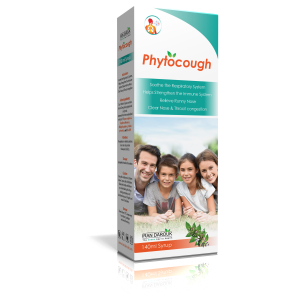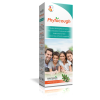Phytocough
• Soothe the respiratory system
• Helps the strengthen the immune system
• Relieve runny nose
• Clear nose and throat congestion
Children aged 2-4 years: Twice a day, 1 teaspoonful after breakfast and lunch
Children above 4 years old and adults: Twice a day, 2 teaspoonful after breakfast and lunch
For a better result, continue treatment up to 2-3 weeks, repeat the treatment if necessary.
This product is made from high quality local and imported herbs organically planted and harvested. It has been formulated by Iran Darouk Pharmaceuticals.
Avoid concomitant use of this drug with antacid products due to the presence of iron in thyme.
Consult with your healthcare, if you are taking deferoxamine (especially at the first months of the treatment), fluphenazine, drugs containing estrogen, contraceptives, anticoagulants, and products containing vitamin C.
Store below 25℃, away from light and freezing.
Keep out of sight and reach of children.
Disposal
Do not put into sewer lines. Dispose in the everyday rubbish bin.
Side effects
Mild stimulatory effect on stomach mucus, increases the probability of spotting in women, in high doses, it increases gastrointestinal secretion, and due to its vitamin C content, it may cause nausea and vomiting and abdominal cramp, insomnia, accumulation in the joints due to gout (due to increased uric acid), diarrhea. There is a chance of formation of urate, oxalate and cysteine stones in individuals with the history of kidney stone.
When NOT to take it
• Use cautiously in severe digestive disorders.
• Contraindicated in individuals with a history of allergies to thyme and any other herbs or ingredients used in the product.
• Patients who have gallstones should only take this medicine after consulting their physician.
• People who are on a sodium-restricted diet or on anticoagulant therapy should not receive high levels of vitamin C for a long period of treatment.
• Not to be taken by children under 2 years of age.
• People who smoke are in need of higher doses of vitamin C.
• High intake of vitamin C increases the absorption of vitamin B12 by increasing the pH of the small intestine.
Thing you must do
• Precipitation in herbal solution does not reduce its therapeutic effect. Shake bottle well before use.
Avoid taking this medicine during pregnancy and lactation.



Comments
Add new comment